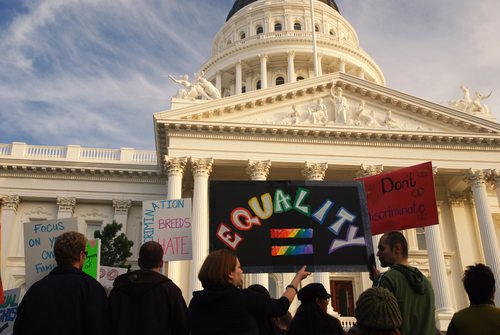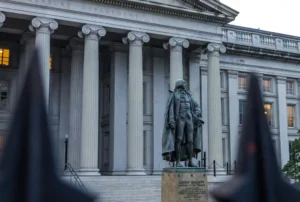
Karin Hildebrand Lau / Shutterstock.com
May 9, 2012; Source: ABC News
Discussing what many consider the most glaring civil rights issue the U.S. has largely failed to address, President Barack Obama says he supports same-sex marriage rights. In an interviewed that aired on ABC News’ “Good Morning America” this morning, President Obama explained his support for enabling gay and lesbian individuals to get married—a policy that is currently the law of the land in eight states and Washington, D.C. but illegal in most states. The president’s announcement came on the heels of a vote on Tuesday in which North Carolina voters approved an amendment to the state’s constitution that bans both same-sex marriage and civil unions. Prior to the vote, on Sunday, Vice President Joe Biden said that he was “absolutely comfortable” with same-sex marriage, but President Obama had wavered on the question, previously stating that his position on marriage equality was “evolving.”
By Wednesday, it became clear that Obama’s position had evolved to the point of outright support for marriage equality. Obama, the first president to take such a position, explained his stance on the marriage rights of same-sex couples to ABC’s Robin Roberts on Thursday morning. Here are some of the more significant points that the president touched upon in the interview:
On his position: “At a certain point, I’ve just concluded that, for me personally, it is important for me to go ahead and affirm that I think same-sex couples should be able to get married…Part of my hesitation on this has also been I didn’t want to nationalize the issue…And I continue to believe that this is an issue that is going to be worked out at the local level, because historically, this has not been a federal issue, what’s recognized as a marriage.”
Sign up for our free newsletters
Subscribe to NPQ's newsletters to have our top stories delivered directly to your inbox.
By signing up, you agree to our privacy policy and terms of use, and to receive messages from NPQ and our partners.
On why he decided to take this position: “…When I meet gay and lesbian couples, when I meet same-sex couples, and I see how caring they are, how much love they have in their hearts, how they’re taking care of their kids. When I hear from them the pain they feel that somehow they are still considered less than full citizens when it comes to their legal rights, then, for me, I think it just has tipped the scales in that direction.”
On objections by some in the religious community: “[New York] did a good job in engaging the religious community. Making it absolutely clear that what we’re talking about are civil marriages and civil laws. That they’re respectful of religious liberty. That, you know, churches and other faith institutions are still going to be able to make determinations about what their sacraments are—what they recognize. But from the perspective of the law and perspective of the state, I think it’s important to say that in this country we’ve always been about fairness. And treating everybody as equals. Or at least that’s been our aspiration. And I think that applies here, as well.”
On those who strongly disagree with his position: “I understand their perspective, in part because their impulse is the right one…They want to preserve and strengthen families. And I think they’re concerned about, ‘Won’t you see families breaking down?’ It’s just that maybe they haven’t had the experience that I have had in seeing same-sex couples, who are as committed, as monogamous, as responsible, as loving a group of parents as any heterosexual couple that I know. And in some cases, more so.”
On the influence of his family: “Malia and Sasha, they’ve got friends whose parents are same-sex couples. And I—you know, there have been times where Michelle and I have been sitting around the dinner table. And we’ve been talking and—about their friends and their parents. And Malia and Sasha would—it wouldn’t dawn on them that somehow their friends’ parents would be treated differently. It doesn’t make sense to them. And frankly, that’s the kind of thing that prompts a change of perspective. You know, not wanting to somehow explain to your child why somebody should be treated differently, when it comes to the eyes of the law.”
Many nonprofit LGBT rights advocates have been waiting for a president to say something along these lines for a long time now. While the president’s words won’t have any immediate, substantive impact on state policies regarding same-sex marriage rights, they certainly change the dialogue, aligning the Oval Office with longstanding demands for total equality for U.S. gay and lesbian citizens for the first time in history. –Mike Keefe-Feldman












